|
Reviews
CERAMIC HOBS: Psychiatric
Underground CD (PUMF/MENTAL GURU)
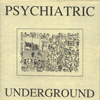 If you
didn't read the last Muckraker magazine, you might not know that
the Ceramic Hobs are a band from Blackpool, England, one of the
few towns in that entire nation that might not have any tourist
trade whatsoever. True outsiders, eh? Why yes, in fact: the Hobs
are somewhat notorious for having members who have been in and
out of mental institutions. Psychiatric Underground is
their debut, a stuffed-to-the-gills 72-minute CD about what Muckraker
called "information sickness." In that mag, Patrick
Marley described it as too long, and if you've read any number
of my reviews you probably know that I think everything's
too long. Well, of course Psychiatric Underground is too
long, but there's nothing on it that is less than equal to anything
else on it, and if the only way I'm gonna hear any of this is
as part and parcel of a dense and broilingly overlong 72-minute
CD, I'll take all 72 minutes. If you
didn't read the last Muckraker magazine, you might not know that
the Ceramic Hobs are a band from Blackpool, England, one of the
few towns in that entire nation that might not have any tourist
trade whatsoever. True outsiders, eh? Why yes, in fact: the Hobs
are somewhat notorious for having members who have been in and
out of mental institutions. Psychiatric Underground is
their debut, a stuffed-to-the-gills 72-minute CD about what Muckraker
called "information sickness." In that mag, Patrick
Marley described it as too long, and if you've read any number
of my reviews you probably know that I think everything's
too long. Well, of course Psychiatric Underground is too
long, but there's nothing on it that is less than equal to anything
else on it, and if the only way I'm gonna hear any of this is
as part and parcel of a dense and broilingly overlong 72-minute
CD, I'll take all 72 minutes.
Besides, it's a concept
album....about how a mentally dubious society defines -- and persecutes
-- their mentally ill underground. The slogans ("Identity
exists neither as a social construct nor as an abstract interior
'truth.' Death to the softest of the soft cops!") don't help
much, but lyrics to a song like "Total Disarmament"
will: "the company took over our childish games with a fist
of hard steel and a black iron cage and our memory erodes with
the passing of time to a sordid bad joke or just sad petty crime
and the visions we saw are forgotten with age as a fresh crop
of victims turn over their page to be culled and corroded as was
done to us by the vampires who bend all our dramas to their cause
and the histories bury us but not before breaking our hearts in
perpetuity snatching and taking our love and our rage to leave
us bereft of all joy and all terror indifferent to death."
The music for this song is folky -- weird but not blaringly noisy,
with very discernable lyrics, as close as the Hobs will ever get
to bands like The Clash and The Pogues (which they do kinda resemble
in a very distant Bizarro-world kinda way).
Hell, some of the songs here
have enough articulate storytelling and imagery going on that,
if you look beneath the noisy and freaky production swirling throughout,
you could describe them as Dylanesque. Certainly the title track
is a protest song: "Shaun was timid Shaun was meek not exactly
dangerous you might even call him weak he was a perfect nuisance
nobody can deny but instead of offering love and care the state
left him to die he had the same hopes and dreams as us all but
they locked him in a cell with four bare walls he was probably
scared he maybe heard voices now there's one less drain on the
system's resources they could have sectioned him again God knows
that's bad enough they didn't even show him that much love I'm
not too surprised what happened to him cos they did much the same
to my friend Tim a stutter and a laugh as you listened to U2 if
no-one else does I'll remember you."
GANG WIZARD: El Cortez Buy
Y' A Drink CD (apparently
a lot of labels pitched in on this; I got mine from Unread Records)
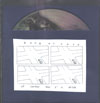 (PLEASE
NOTE: Only tracks 2-5 are reviewed here.) Track two they start
out dragging the mud just like MX-80 Sound did on this track from
1981 I listened to today. Then they (Gang Wizard) just stop dragging
and let the whole thing slowly disintegrate for quite awhile.
Around the 7-minute mark, one guitarist is just doing random blasts
of amp noise, like a big foghorn on a shore. The other guys in
the band start chiming in and swirling like, you know, the wind
& water & lightning spirits out on the ocean responding
to the clarion blasts. That's right, dudes: It's elemental! Gang
Wizard, like the New Faggot Cunts of Nashville, TN, have got the
dirty-acid jam-band ethos down cold. (PLEASE
NOTE: Only tracks 2-5 are reviewed here.) Track two they start
out dragging the mud just like MX-80 Sound did on this track from
1981 I listened to today. Then they (Gang Wizard) just stop dragging
and let the whole thing slowly disintegrate for quite awhile.
Around the 7-minute mark, one guitarist is just doing random blasts
of amp noise, like a big foghorn on a shore. The other guys in
the band start chiming in and swirling like, you know, the wind
& water & lightning spirits out on the ocean responding
to the clarion blasts. That's right, dudes: It's elemental! Gang
Wizard, like the New Faggot Cunts of Nashville, TN, have got the
dirty-acid jam-band ethos down cold.
Track three "catch
me watch me" takes things further and harsher, like an improvised
Black Flag. Even if it is totally improvised, it's still definitely
a song; the title is audibly sung by the singer a few times. "Lead
guitar by Phil Kretschman," who does a good job, and plays
drums (also well) on track 4 "fucking rosie," and just
"guitar" (not "lead guitar") on track 6 "california."
Funny, that's the second
song called "California" that I've listened to today.
The other was a totally different number written and performed
by Bobby Conn, on his 1998 masterpiece Rise Up! Around
the same time, Mr. Bungle put out an album called California,
but I didn't listen to that today. In fact, I don't own it and
have only listened to it two times in my life, once in a record
store, and once at Joe Krings's house. I really liked one song,
I think the first one. Gang Wizard is (more or less) from California,
the coastal city of Oxnard, I believe, which might explain the
foghorn imagery somewhat.
I love to visit California
and when I do always wonder when I'm just going to give up and
start living there already. (I say the same thing about Nashville,
TN on another page of this same issue. What can I say, I'm a restless
soul.) If I did move to Southern California, I'd go to Gang Wizard
shows. Hell, I'd play guitar for Gang Wizard, if they'd have me.
"fucking rosie" is an extremely harsh track...these
guys really are one of the meanest bands around, noisy or not.
They really are the next logical extension of Black Flag. (Also
from California.) Of course, right after I say that, on comes
track 5 "i am a snarling ocelot," with no drums, no
screaming guitar, just a gad-damned improvisation for two music
boxes.
INSTRUCTION SHUTTLE: Camo:
Music For Urbane Warfare CD-R (ASTROMASS)
 The
phrase "urbane warfare" had some kind of post-September
11th sting to it when I read it a couple months ago, but it's
wearing off. Context is slowly settling back into place after
that context-shattering day. Either way, Instruction Shuttle mailed
me this record quite a while before then -- I meant to review
it for the issue that came out in July. It was interesting for
me to get this record, as it's the most straight-up techno/electronica/IDM/whatever
thing that's been mailed to me. Hell, the guy who does Instruction
Shuttle has a monthly DJ gig in Brooklyn. Still, he told me in
e-mail that this is the first record he did with "beats." The
phrase "urbane warfare" had some kind of post-September
11th sting to it when I read it a couple months ago, but it's
wearing off. Context is slowly settling back into place after
that context-shattering day. Either way, Instruction Shuttle mailed
me this record quite a while before then -- I meant to review
it for the issue that came out in July. It was interesting for
me to get this record, as it's the most straight-up techno/electronica/IDM/whatever
thing that's been mailed to me. Hell, the guy who does Instruction
Shuttle has a monthly DJ gig in Brooklyn. Still, he told me in
e-mail that this is the first record he did with "beats."
Against my perceived
'better judgment,' I find a lot of techno-type music listenable.
I think it's some of the finest background music yet invented.
But, getting this CD-R in the mail and playing it with the idea
of reviewing it, I don't feel especially qualified to discuss
it; I just don't know the stuff that well. I'll admit that usually
when I do hear it, in some Chicago record store or on WNUR
or at some electronica-person's apartment, I
think it sounds pretty good, but that also scares me a little
bit. It's the first truly faceless music I've come across. It's
like the intellectual underground has come full circle and taken
over background wallpaper muzak styles and made them their own
too.
Instruction Shuttle avoid
these kind of tendencies. The music is more for listening than
for dancing, but also too aggressive to be IDM wallpaper. Their
website
describes Camo as "a cdr filled with chopped up beats
and confusing textures." It's
energetic, borderline assaultive, with loud electro sounds mixed
loud and EQ'd for maximum crispness, arranged into complex, insistent
rhythm patterns. The EQ'ing and anti-quasi-funk reminds me of
Autechre more than anyone. I'm sure that's not really a surprise
to any of you more knowledgable techno people. In fact, just before
getting this in the mail I got hold of the third issue of Sound
Collector magazine, featuring an interview with Matmos in which
they refer to the recording of their album The West as
"definitely [letting] us step aside from the 'let's imitate
autechre' race that so many electronic types seem caught up in
at the moment." Well, I might be entirely wrong, but it sounds
to me like Instruction Shuttle still has a little of the 'let's
imitate autechre' spirit, especially with song titles like "nidd,"
"achtsys," and "twisks six." Still, their
Autechre imitation is less brazen and more engaging to me than,
for example, Radiohead's. And, in fact, I have a couple Autechre
discs, but I hardly ever play 'em, and next time I feel the need
I'll play Instruction Shuttle instead.
MONORAIL TRESPASSING roundup
Got three items in the mail from the Monorail Trespassing label.
It's based in Tulare, California, a town of some 33,000 people,
about 40 miles south of Fresno and about 40 miles north of the
middle of nowhere. Not exactly a hotbed of culture, I'm sure,
which is all the more reason to write about 'em.
 First
up is Monorail Trespassing release #2, a Richard Ramirez/ First
up is Monorail Trespassing release #2, a Richard Ramirez/
Flatline Construct/ Prurient collab CD. It's a CD, but it comes
packaged like a CD-R, covered by a mere folded-over piece of red
paper packed into the plastic bag for a 7-inch record. The bag
is folded over to fit the odd shaped paper, and then scotch-taped
closed. The paper features a collage in which images from a teapot
catalog are interspersed with images from a dildo catalog. (Noise
musicians will never completely stop using sexshop imagery. That'd
be like rock musicians completely stopping the use of long hair
imagery or guitar imagery.)
The liner notes are
rather informative, offering a "breakdown of the collaborative
process" and describing how this collab "was originally
released as a limited 60 minute cassette on Let It Rot, packaged
in a video box" and that "roughly 40 copies were made,
" and that "This version is a split label release between
Monorail Trespassing, Hospital Productions, and Peel Back The
Sky in an edition of 500 copies." Monorail Trespassing is
from Tulare, CA, Hospital Productions is from Providence, RI,
and Peel Back The Sky is from Little York, NJ. As for the artists,
Richard Ramirez is from Houston, TX, Flatline Construction is
from Keene, Ontario, Canada, and Prurient in fact has the same
Providence, RI address as Hospital Productions. These worldwide
harsh noise artists sure can network, huh?
As for the music
on here, it's kinda like the Instruction Shuttle CD-R: a stalwart
example of an obscure, abstract genre of music. Instruction Shuttle
wins by being funky; this noise stuff, on the other hand, I'm
just not in the mood for. Straight up, I like noise that's a little
less harsh, a little less trebly, a little less squalling. I'm
sure I could listen to this in a different situation and be fairly
knocked out by it. For example, I could turn the volume down just
a little...there, just did, and you know, it is kinda nice
this way...easier to zone in and out of.
I also kind of
like the metallic vocals I can hear teasing through the din, here
at the 11:46 mark. I tell ya, though, there's 61 minutes of music
on here (two 30-minute odd tracks), and I really don't know if
I'll ever play this disc all the way through. Definitely not without
me leaving the room or otherwise completely disengaging my attention,
as there seems to be exactly zero surprises throughout its entire
duration, just stalwart gushing streaming noise. Which is probably
just how these folks want it. (Actually, this vaguely watery sound
that occurs once at around the 13:16 mark of track two is sorta
suprising. Also slightly surprising is a brief sound that kind
of sounds like maniacal laughter, which occurs less than a minute
after the watery sound.)
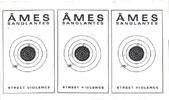 Next
up is Monorail Trespassing #4, a CD-R by Âmes Sanglantes
called Street Violence. It's also packaged in a scotch-taped
plastic bag and folded-over piece of xeroxed paper. Nice B&W
underground style graphics. No sexshop imagery here, although
there does seem to be a (relatively subtle) reference to some
true-life killing spree. This artist/band/ Next
up is Monorail Trespassing #4, a CD-R by Âmes Sanglantes
called Street Violence. It's also packaged in a scotch-taped
plastic bag and folded-over piece of xeroxed paper. Nice B&W
underground style graphics. No sexshop imagery here, although
there does seem to be a (relatively subtle) reference to some
true-life killing spree. This artist/band/
project is from the city of Saint-Hubert in Quebec, which seems
to be near Montreal, which means that Âmes Sanglantes probably
even speak French as a first language. Like the Richard Ramirez/Flatline
Construct/Prurient collab, this one also features two tracks,
but this time they are refreshingly half as long at 15-odd minutes
apiece. The approach ain't too much different, though: more grinding,
squalling, chirping, freaky, harsh, and basically narrative-free
noise. I guess the whole narrative is in the
titles: "Being Beat Up" and "Being Beat Up Again."
I'm liking this one better than the Richard Ramirez/Flatline Construct/Prurient,
though. It might only be because the tracks are shorter, but it
might be something else too, somewhere in the sound, which is
why noise continues to fascinate me. Look at the thumbprints of
two different people until you start to see the differences. 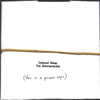 (Man.) (Man.)
Last
but not least, Monorail Trespassing sent an item called The
Somnambulist by Delayed Sleep. It doesn't yet appear on their
catalog, and comes in an ultra-simple folded-and-rubber-banded
piece of white paper package that has "(this is a promo copy)"
hand-written on it. Seems to be a CD-R reissue of a cassette from
2000. Delayed Sleep is a Sacramento-based duo of Matt Kretzmann
and Pat Mabie on "guitars, effects, vocals, tapes."
It starts out with very mellow, distant guitar hums with lots
of space in between and continues in that vein for a nice long
time. My personal preference lies more for this kind of music
than that of Richard Ramirez/Flatline Construct/Prurient and Âmes
Sanglantes. What can I say, I'm a mellow dude. Still, lord knows
I don't automatically like all the mellow two-guitar improvisation
I hear, so Delayed Sleep must be doing something right. And when
I say "mellow," I don't mean that it's "pretty"
and "soothing" -- the sounds are in fact quite weird
and ominous, just in a very low-key way. They've got a website
that lists their various interesting projects and puts out the
call that they want to play anywhere anytime.
And that's about it for the
Monorail Trespassing round-up. Thanks to Jon Borges for sending
me this stuff. His label's website is here.
PUBLIC IMAGE LIMITED:
First Issue LP
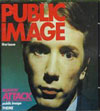 I
got this one out for the first time in a few years because my
friend Kelly, who just moved here from New York City, got a job
for Martin Atkins's label Invisible. I was always way into the
Atkins/Jah Wobble rhythm section as it appears on this record
and its followup Second Edition. Since Kelly was working
with Martin Atkins every day at the office, I thought I'd get
out my copy of First Issue and show off its cool design:
using the front and back of both the outside and inside sleeves,
each of the four band members have their own full-color cover-size
supermodel-style portrait. I asked Kelly to show me which one
Martin Atkins was, as the only ones I could recognize for sure
were ole Johnny Lydon, of course, right there on the front, and
Keith Levene. I
got this one out for the first time in a few years because my
friend Kelly, who just moved here from New York City, got a job
for Martin Atkins's label Invisible. I was always way into the
Atkins/Jah Wobble rhythm section as it appears on this record
and its followup Second Edition. Since Kelly was working
with Martin Atkins every day at the office, I thought I'd get
out my copy of First Issue and show off its cool design:
using the front and back of both the outside and inside sleeves,
each of the four band members have their own full-color cover-size
supermodel-style portrait. I asked Kelly to show me which one
Martin Atkins was, as the only ones I could recognize for sure
were ole Johnny Lydon, of course, right there on the front, and
Keith Levene.
Funny thing was, even Kelly wasn't
quite sure which one was Atkins, though she thought he was probably
the one with the moustache. She
said that word around the office was that Martin "used to
be really hot," and pretty much still was, even though he
had (d?)evolved into some sort of dreadlocked
industrial
music look. I was thinking about getting her to get him to autograph
the LP sleeve his picture was on, until one day when I spent about
5 minutes researching First Issue on the internet. I quickly
learned that the drummer on the album wasn't Atkins at all, but
a Canadian guy living in London named Jim Walker. He's the one
pictured too. No
wonder she couldn't recognize Martin.
And no matter, the reason
I have this stuff is because of the end product. That's why PiL
didn't even list the names of the band-members on the otherwise
lavish sleeve; they knew they were one of the heaviest bands of
all time anyway, right up there with Led Zeppelin and Black Sabbath,
no joke. The opening song "Theme," eight minutes of
slow-ass doom-crush with Mr. Lydon sparsely howling over the top,
serves as a blueprint for so much that came after it ('late-period'
slowed-down Black Flag, the Jesus Lizard, Arab on Radar)
and still out-pounds
all of it. In fact, First Issue, and the next two, Second
Edition and The Flowers of Romance, all stand up to
the contemporaneous records made by more singularly avant-garde
peers like This Heat, The Pop Group, and The Birthday Party.
I first heard First
Issue when I was living in a University of Nebraska fraternity
house some 12 years ago. David Meister, one of maybe three other
residents who actually listened to music you couldn't hear on
the radio, bought it on cassette at a short-lived store in town
called Project Import, took it back to the room he shared with
three other college freshmen, and played it over and over again
for months straight. One of his roommates, predictably, was a
devout Christian Republican from Kearney, Nebraska. Needless to
say, this gentleman did not appreciate the lumbering death-howl
that was "Theme," but when it came to the second track,
John Lydon's take on "Religion," he was ready to call
the police.
Even I, who had
dared to describe myself as "agnostic" and even, on
one or two occasions, "atheist", was taken aback by
Lydon's cold introduction: "Stained glass windows keep the
cold outside/While the hypocrites hide inside/With the lies of
statues in their minds/Where the Christian religion made them
blind/Where they hide and pray to the God/of a bitch spelled backwards
is dog/Not for one race, one creed, one world/But for money."
At a year-end pledge class meeting our friend from the religious
right was still troubled by it, bringing it up during some sort
of 'share your feelings' 'rap session' we were made to do. He
had learned that semester that there were hundreds, perhaps even
thousands, of Nebraskans -- Nebraskans, even! -- who had a worldview
completely different than his, and this was hard news.
Hell, I feel for
him: processing this sort of systematic destruction of the system's
symbols is hard work, even for the people who are kind of into
it. It's probably not easy to be the ones playing the music, either,
so it's not surprising that the band loosens up and rocks a little
for the side closer "Annalisa." It actually sounds like
it could be Led Zeppelin, or at least Jimmy Page slashing away
on guitar over a humongous Bonham-and-Jones stomp. Of course,
any chance for Robert Plant to be invoked is completely negated
by Lydon's excoriating howl.
Side two opens with
what may be the single finest song in post-punk history, a more
jubilant "theme" song called "Public Image."
There's a couple more solid ones, but the track that resonates
as much from those days as "Religion" and "Public
Image" is the insane album closer "Fodderstompf,"
in which Jah Wobble lays down a devastating dub bass line over
a disco beat, and a multitracked Lydon chants "We only wanted
to be loved!" over and over again in a goofy but terrifying
goblin voice. A great website
about P.I.L. named after this track describes it further: "...a
strangely edited, dubbed disco dance beat with the voices of members
of the band as if sucking on helium discussing how they want to
make the album with as little effort as possible and chiding the
hippie engineer."
POSTSCRIPT:
Just a few weeks after my getting this album out, I read the new
book Our Band Could Be Your Life, by Michael Azerrad. (Little,
Brown; 2001.) Each chapter of the book is a short, heartfelt history
of a key band from the 80s underground rock movement. Azerrad
spins the stories of Black Flag, the Minutemen, Mission of Burma,
the Replacements, Big Black, Minor Threat, Fugazi, and quite a
few more. Hilariously, a certain event happens to at least three
different bands in the book: they serve as local opener for their
visiting heroes Public Image Limited and end up thinking they
are pricks.
Says Mike Watt,
p. 78: "[The Minutemen] were on our second song and the motherfucker
[John Lydon] is on the side of the stage, tapping his watch."
From pp.
116-7: "Mission of Burma's final show was at the Paramount
Theatre in Staten Island, opening for Public Image, Ltd. The show
was a disaster... At first PiL's management wouldn't allow Mission
of Burma to use the PA, so the vocals came out the onstage monitors
for the first half of the set. One of PiLs roadies patrolled the
front row with a bullwhip, menacing anyone who got too close,
until Miller demanded he go away."
On p. 145:
"When Minor Threat got asked to open for PiL at a Halloween
show [in 1982] at Maryland University...Public Image had demanded
such a high fee that the promoters couldn't afford to pay the
opening band." Adds Ian MacKaye, just down the page: "...we
came offstage and just as we walked to the back doors, which were
flung open, I saw this limousine pull up and Lydon got out of
this limousine! They weren't even at the fuckin' show! Those fuckin'
assholes!"
And finally,
on p. 418, about a show in Seattle where locals Green River opened
for PiL: "At the end of [Green River's] set, [lead singer
Mark] Arm told the crowd, 'If you want to see what happens to
somebody who's completely sold out, just wait.' And while PiL
played, Green River trashed their dressing room."
Another
funny thing: I just looked First Issue by Public Image
Ltd. up on CD Now, and in its current 'import only' pressing,
its selling for $20.99 (list price $23.99!). Guess I'm glad I
bought this LP for $10 when I did...
TORU
YONEYAMA & OSAMA KATO: Luv Rokambo CD-R (PUBLIC EYESORE)
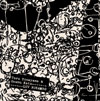 In
the time it takes the average person to merely say the phrase
"A&R man," Public Eyesore has probably put out another
five or six CD-R releases. When it comes to broken, fractured,
post-noise improvised music from the U.S. and Japan circa 2000,
Bryan Day is your Bernard Stollman and then some. With this sort
of prolificacy, there's bound to be some filler somewhere. Maybe
"filler" is too harsh of a word, but if you ever decide
not to get all 40 available Public Eyesore releases, this might
be a good one to put towards the bottom of the list. It's not
that I don't enjoy the sound and intent of this set of broken,
fractured, post-noise improvised music for toys, rapmans, heavily
reverbed stratocasters, jazzy drums, and lost moaning vocals,
but it does make me think that maybe, for those of us who weren't
there in the moment, it should've been excerpted for a compilation
or a 7-inch instead of a CD-R. In
the time it takes the average person to merely say the phrase
"A&R man," Public Eyesore has probably put out another
five or six CD-R releases. When it comes to broken, fractured,
post-noise improvised music from the U.S. and Japan circa 2000,
Bryan Day is your Bernard Stollman and then some. With this sort
of prolificacy, there's bound to be some filler somewhere. Maybe
"filler" is too harsh of a word, but if you ever decide
not to get all 40 available Public Eyesore releases, this might
be a good one to put towards the bottom of the list. It's not
that I don't enjoy the sound and intent of this set of broken,
fractured, post-noise improvised music for toys, rapmans, heavily
reverbed stratocasters, jazzy drums, and lost moaning vocals,
but it does make me think that maybe, for those of us who weren't
there in the moment, it should've been excerpted for a compilation
or a 7-inch instead of a CD-R.
There are good sections,
to be sure, and the battery-op/toys approach to improv is still
refreshing, but there's also a strangely unengaging air to the
album. When the guys start bouncing truncated blues riffs back
and forth somewhere in the middle, it sounds like they wanna go
Beefheart or No Wave but their 'improv' context won't let them
rock out. Jump ahead to track five, "how dare u?", and
hear their battery-op broken funk approach at its best...but the
track is less than two minutes long. The last track "chicago"
is over ten minutes and features eerie, quiet interplay between
the two guitars...it could've been a fine track in the spirit
of recent super-mellow Charalambides material (the Home
CD-R), but something proggy slips a little too far into it a little
too often...and alas, I can't help but think of this music as
what Greg Chapman refers to as 'prov lite.
|

